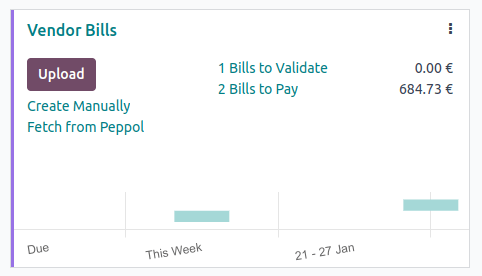Faturamento eletrônico (EDI)¶
EDI, ou intercâmbio eletrônico de dados, é a comunicação entre empresas de documentos comerciais, como pedidos de compra e faturas, em um formato padrão. O envio de documentos de acordo com um padrão EDI garante que a máquina que recebe a mensagem possa interpretar as informações corretamente. Existem vários formatos de arquivos EDI disponíveis, dependendo do país de sua empresa.
O recurso EDI permite automatizar a administração entre empresas, além de ser exigido por alguns governos para controle fiscal ou para facilitar a administração.
O faturamento eletrônico de seus documentos, como faturas de clientes, notas de crédito ou contas de fornecedores, é uma das aplicações do EDI.
O Odoo suporta, entre outros, os seguintes formatos.
Nome do formato |
Aplicações |
|---|---|
Factur-X (CII) |
Todos os clientes |
Peppol BIS Billing 3.0 |
Todos os clientes |
XRechnung (UBL) |
Todos os clientes |
Fattura PA (IT) |
Empresas italianas |
CFDI (4.0) |
Empresas mexicanas |
Peru UBL 2.1 |
Empresas peruanas |
SII IVA Llevanza de libros registro (ES) |
Empresas espanholas |
UBL 2.1 (Columbia) |
Empresas colombianas |
Autoridade fiscal egípcia |
Empresas egípcias |
E-Invoice (IN) |
Empresas indianas |
NLCIUS (Netherlands) |
Empresas holandesas |
EHF 3.0 |
Norwegian companies |
SG BIS Billing 3.0 |
Empresas de Cingapura |
A-NZ BIS Billing 3.0 |
Todos os clientes |
Nota
O formato Factur-X (CII) permite verificações de validação na fatura e gera arquivos compatíveis com PDF/A-3.
Todo PDF gerado pelo Odoo inclui um arquivo XML Factur-X integrado.
Veja também
Configuração¶
Por padrão, o formato disponível na janela enviar depende do país de seu cliente.
É possível definir um formato específico de faturamento eletrônico para cada cliente. Para fazer isso, vá para , abra o formulário do cliente, vá para a aba Financeiro e selecione o formato adequado.

Faturamento eletrônico nacional¶
Dependendo do país de sua empresa (ex.: Itália, Espanha, México, etc.), pode ser necessário emitir documentos de faturamento eletrônico em um formato específico para todas as suas faturas. Nesse caso, é possível definir um formato padrão de faturamento eletrônico para seu diário de vendas.
Para fazer isso, vá para , abra seu diário de vendas, vá para a abauia Configurações avançadas e ative os formatos necessários para esse diário.
Geração de faturas eletrônicas¶
Em uma fatura confirmada, clique em Enviar e imprimir para abrir a janela de envio. Marque a opção de faturamento eletrônico para gerar e anexar o arquivo da fatura eletrônica.
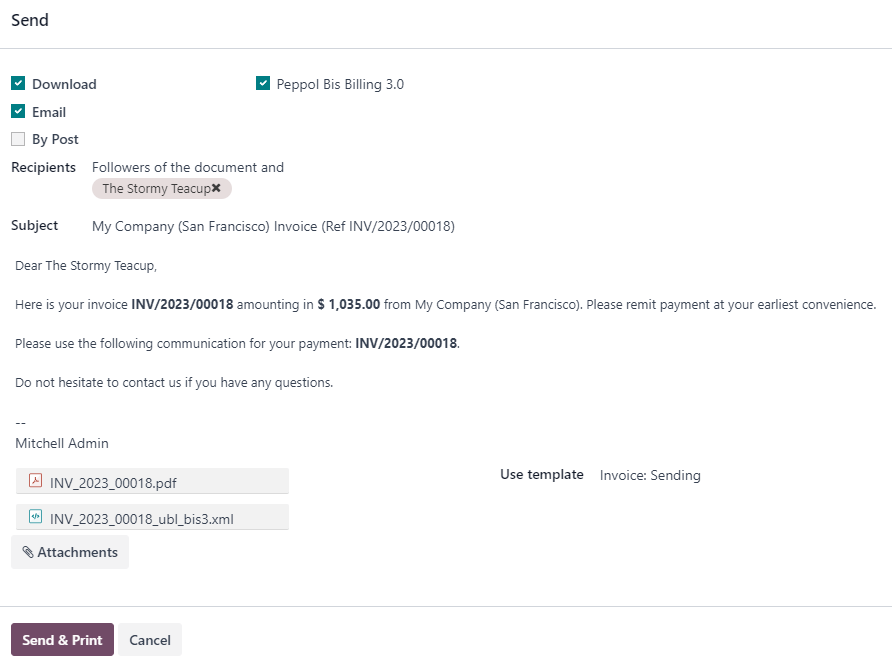
Peppol¶
A rede Peppol garante a troca de documentos e informações entre empresas e autoridades governamentais. Ela é usada principalmente para faturamento eletrônico, e seus pontos de acesso (conectores à rede Peppol) permitem que as empresas troquem documentos eletrônicos.
O Odoo é um ponto de acesso e um SMP, permitindo transações de faturamento eletrônico sem a necessidade de enviar faturas e contas por e-mail ou correio.
Se ainda não feito, instale o módulo Peppol (account_peppol).
Importante
O registro do Peppol é gratuito e está disponível no Odoo Community
Você pode enviar Faturas do cliente e Notas de crédito e receber Contas de fornecedores e Reembolsos via Peppol.
You can send in one of the following supported document formats: BIS Billing 3.0, XRechnung CIUS, NLCIUS.
- Os seguintes países são elegíveis para o registro da Peppol no Odoo:Andorra, Albânia, Áustria, Bósnia e Herzegovina, Bélgica, Bulgária, Suíça, Chipre, República Tcheca, Alemanha, Dinamarca, Estônia, Espanha, Finlândia, França, Reino Unido, Grécia, Croácia, Hungria, Irlanda, Islândia, Itália, Liechtenstein, Lituânia, Luxemburgo, Letônia, Mônaco, Montenegro, Macedônia do Norte, Malta, Países Baixos, Noruega, Polônia, Portugal, Romênia, Sérvia, Suécia, Eslovênia, Eslováquia, São Marino, Turquia, Santa Sé (Estado da Cidade do Vaticano)
Inscrição¶
Go to . If you do not have the Peppol module installed, first tick the Enable PEPPOL checkbox and then manually save.

Preencha as seguintes informações:
Peppol EAS. This is the Peppol Electronic Address Scheme and usually depends on your company’s country. Odoo often prefills this with the most commonly used EAS code in your country. For example, the preferred EAS code for most companies in Belgium is 0208.
Peppol Endpoint. This is usually a Company Registry number or a VAT number.
Phone Number, including the country code (e.g.,
+32in Belgium)Primary contact email
Veja também
Peppol Endpoint - Listas de códigos OpenPeppol eDEC (abra a página “Participant Identifier Schemes” como HTML)
If you are migrating from another access point, insert the Migration key from the previous provider.
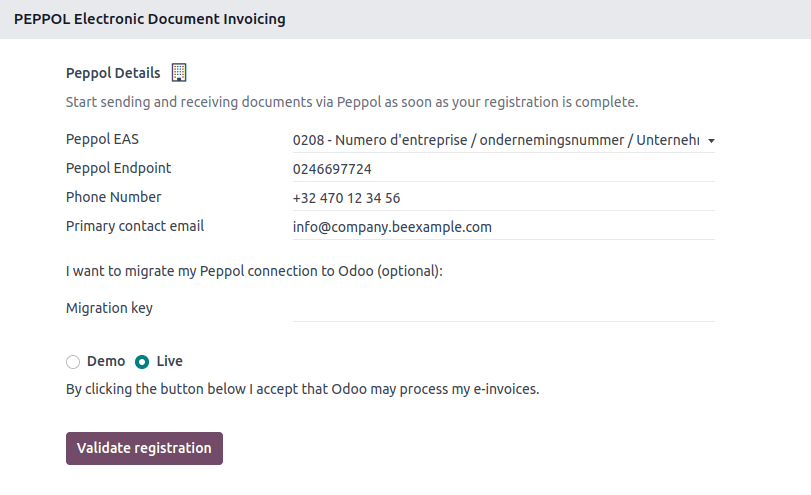
Finally, click Validate registration. If you want to explore or demo Peppol, you can choose to register in Demo mode. Otherwise, select Live.
Nota
When testing Peppol, the system parameter account_peppol.edi.mode can be changed to test.
Then, a radio button appears with the option to register on the test server.
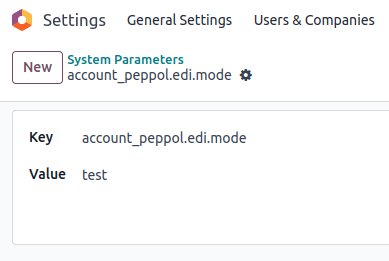

Now, you can request a verification code to be sent to you by clicking Verify phone number.
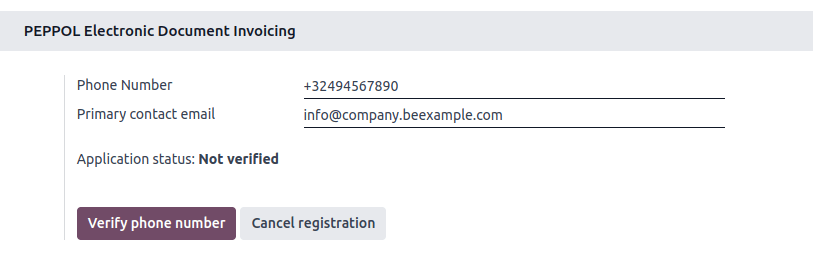
A text message containing a code is sent to the phone number provided to finalize the verification process.
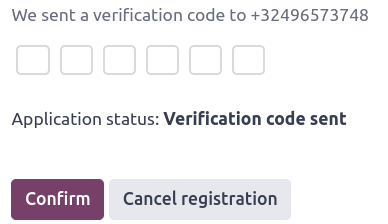
Once you enter the code and click Confirm, you can see that your registration is pending activation. From this point onwards, the default journal for receiving Vendor Bills can be set.
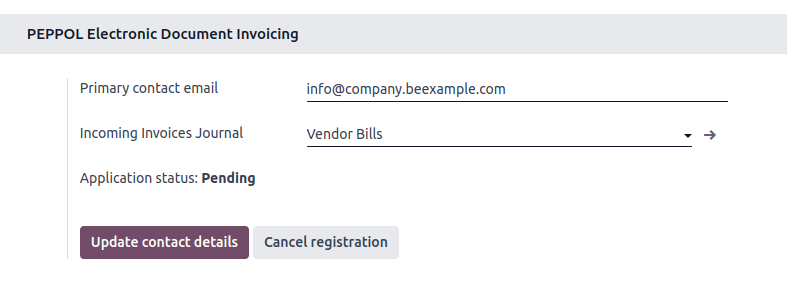
It should be automatically activated within a day.
Dica
It is also possible to manually trigger the cron that checks the registration status by going to .
Your application status should be updated soon after you are registered on the Peppol network.
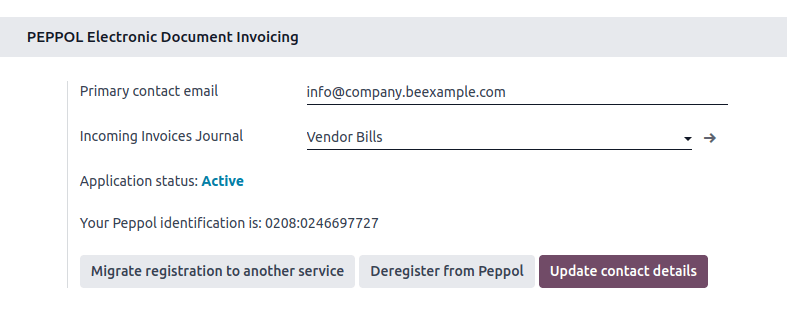
Todas as faturas e contas de fornecedores agora podem ser enviadas diretamente usando a rede Peppol.
Verificação de contato¶
Antes de enviar uma fatura a um contato que usa a rede Peppol, é necessário verificar se ele também está registrado como participante da Peppol.
Para fazer isso, vá para e abra o formulário do cliente. Em seguida, vá para , selecione o formato correto e verifique se o código EAD Peppo e o Endpoint estão preenchidos. Em seguida, clique em Verificar. Se o contato existir na rede, a validade do ponto de extremidade do Peppol será definida como Válido.

Importante
Embora o Odoo preencha previamente o código EAS e o número do Endpoint com base nas informações disponíveis para um contato, é melhor confirmar esses detalhes diretamente com o contato.
É possível verificar o status de participante do Peppol de vários clientes ao mesmo tempo. Para fazer isso, vá para e alterne para a visualização de lista. Selecione os clientes que quer verificar e, em seguida, clique em .
Enviar faturas¶
Quando estiver pronto para enviar uma fatura por meio da rede Peppol, basta clicar em Enviar e imprimir no formulário de fatura. Para enfileirar várias faturas, selecione-as na visualização de lista e clique em e Enviar via PEPPOL precisam estar marcadas.

As faturas lançadas que podem ser enviadas via Peppol são marcadas como Pronto para Peppol. Para exibi-las, use o filtro Pronto para Peppol ou acesse o painel do Financeiro e clique em Faturas prontas para o Peppol no diário de vendas correspondente.

Depois que as faturas são enviadas via Peppol, o status é alterado para Processando. O status é alterado para Concluído depois de terem sido entregues com sucesso ao Ponto de acesso do contato.

Dica
Por padrão, a coluna de status do Peppol fica oculta na visualização de lista de faturas. Você pode optar por exibi-la selecionando-a nas colunas opcionais, acessíveis no canto superior direito da visualização da lista de faturas.
Um cron é executado regularmente para verificar o status dessas faturas. É possível verificar o status antes da execução do cron clicando em Recuperar status da fatura do Peppol no diário de vendas correspondente no painel do Financeiro.
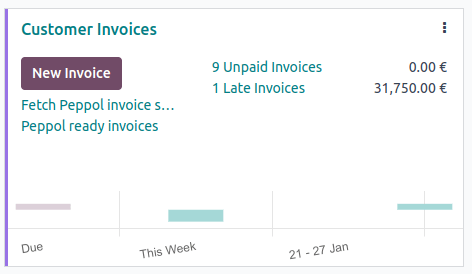
Receber contas de fornecedores¶
Uma vez por dia, um cron verifica se algum documento novo foi enviado a você por Peppol. Esses documentos são importados e as contas de fornecedores correspondentes são criadas automaticamente como rascunhos.

É possível recuperar os documentos recebidos do Peppol antes da execução do cron no painel Financeiro no diário principal de compras do Peppol, definido nas configurações. Basta clicar em Recuperar do Peppol.
